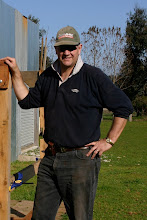During the last week, as well as a lot of rain, we've finished off the compost yard by adding B grade crushed rock to the handling area. All that remains now is to get more galvanised mesh for additional compost containers - and get some extra compostable material.
We made a start on the second task on Friday evening when we got a load of green waste from a guy who runs a green waste collection service in our area. Normally he would take it to the municipal tip and dump it - at a cost of $170.
His first reaction when I said I would be interested was that there would be 'too much crap in it'. As we discussed it, he decided that this would indeed be the case from one part of his route, but that perhaps the more civilised customers (in Woodend for example) could be trusted not to put things in their green waste bag that they shouldn't.
I didn't ask whether this lot came from civilised Woodenders, but there certainly is some stuff that can't be composted. We have been left a number of woolpacks to re-pack the stuff that will have to go to the tip. We've just got to work out how long this process is going to take - and compare that to the value of the fertility we add via an increased compost supply.
Early last week we went to a 2 day seminar with Joel Salatin of Omnivore's Dilemma and Food Inc fame. I've now seen him in person twice - and he is as good as in print. There is an intelligence and intellectual honesty about the man that is really special. Compost is a critical part of his farming system. It's not where I got it from though.
I remember two things as sources of my interest:
- my Dad's use of a deep litter system for housing pigs in the 1960s; and
- reading about the role of compost in gardening from the Yates Garden Guide that my Mum gave me shortly after I got married.
Much of my energy policy work at present is around carbon pricing and the ways in which the electricity and gas systems can be de-carbonised. I have to confess that I probably don't make enough noise about the capacity of composting and the sort of farming we're trying to do to make a difference.
My excuse is that I work at the implementation end of things where the big policy choices have been made and governments (or businesses) need someone to help them 'do it'. I won't work for policy choices I think to be wrong, but experience tells me good, common sense implementation can make all sorts of things work - or work better. And policy almost always turns out to be wrong ... in retrospect.
F





No comments:
Post a Comment